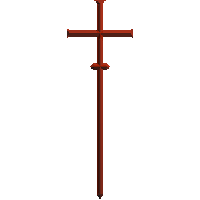Vortumnus
The God of Honor and Chivalry, worship of Vortumnus is at the heart of a schism in the Imperial Church. The Koramian Heresy, based on a tome found on a mystical flying ship in Koramia, states that Lord Ptharos surrendered his throne as king of the gods, recognizing his tendency towards tyranny, and bestowed the crown to Vortumnus, his great-grandson and youngest of the gods. The Imperial Church vehemently denies this and actively persecutes those who follow the Koramian belief.
Where the Koramian Heresy dominates (mainly in Duria and in Narbonne on Aurea), Vortumnus is celebrated as the regal defender of truth, justice and civilization. In much of the rest of Aurea, he is viewed as a minor diety of war often seen as far too restrictive in his rules of war for the common soldier to pray to. On the continent of Gallorea, he is Argistinese, the Warlord of Just Battle. There are remote cults that worship Vortumnus as Cambre, the Hunter, who travels the dark forests at night to strike down the wicked and kill demons, though the worshippers of Cambre have no real heirarchy or church organization.
| Vortumnus |
| God of Honor |
 |
| Descriptive Info |
| Gender: Male |
| Avatar: Argistinese, Warlord of Just Battle; Cambre, the Hunter |
| Allies: Fides (father), Meliboea (mother), Innus (paternal grandfather), Majestas (paternal & maternal grandmother), Zelos (maternal grandfather), Evander, Galea and Sarpedon. |
| Foes: Dagon, Kratos, Mania, Phlegethon, Polydorus, Tethys and Thanatos. |
| Spiritual Info |
| Rank: Intermediate |
| Nature: Ordered |
| Ethos: Benevolent |
| Major Influence: Honor |
| Minor Influence(s): Virtue, Chivalry, Feudalism; as Argistinese, War |
Symbols
The Koramic symbol of Vortumnus is a blue or red cross, pointed at its base; red represents a Crusader or priest at war for Vortumnus. The Imperial symbol is similar, but always golden. Hematite is an important stone to Vortumnus, and is considered to be pieces of his blade that fell off during its construction. Any priest of Vortumnus who uses Hematite in the creation of a magick item, or uses it in spell casting, receives a +1 DR bonus to the casting or castings in question.
Dwelling Place
The Fortress of Mos, on the Empyreal plane.
Servants
St. Julius of the Golden Gladius, St. Alexandros, Garimund the Sainted, St. David Gaelsman the Wodesman, St. Catherine, St. Ian Terraltos, St. Jeremiah Red Rose, St. Matilda, St. Josephus the Avenger.
Doctrine
No information available on the doctrine of Vortumnus
Mission
No information available on the mission of Vortumnus
Geography
No geographic information available on Vortumnus
History of the Church
No historic information available on Vortumnus
Organization
No information available on the Organization of the Church of Vortumnus
Garments
The Imperial tradition holds that a warrior of Vortumnus must wear brass or golden Legionnaire's armor, and carry a brass or golden sword, both of which are liberally decorated with the cross of Vortumnus. Koramic tradition holds that priests must wear some sort of plate armor, full plate if going into war, and often decorate themselves with blue or red robes. The Prelate of Paeldain's garments are elaborate and decorated in gold, silver, and hematite. He wears a golden helm during the most official functions and carries a blue-tinted sword. During services, he wears only a red cap and robes embroidered with the symbols of Vortumnus.
Religious Practices
No information available on the religous practices of the Church of Vortumnus
Customs
The followers of Vortumnus obey the dictates and laws of Chivalry. As such, no follower may disregard or disgrace a female (whether the individual worshipper is male or female), flee a field of just battle, refuse a martial challenge, refuse to assist the meek, refuse the commands of a superior, or act in any way which disgraces his god. Recently, upholding the commands of a superior has come to mean a superior within the Church, instead of a secular superior, but the Koramic code still holds strong that whomever you have dedicated service to, whether by birth, deed, or word, is your superior, as are his superiors above him.
Followers of Vortumnus have many, many customs involving etiquette to superiors and inferiors, too many to list here, but deviation from the dictates of etiquette is not only frowned upon, but extreme examples may even be viewed as being in direct violation of the dictates of Vortumnus.
Warriors of Vortumnus often gather on holy days, or any appropriate day, to test their martial skills against one another in elaborate tourneys, the height of which is always the joust. All followers of Vortumnus who are capable of the purchase and upkeep of a horse are expected to own a horse capable of warfare, and know how to fight from that horse.
Taboos
Priests of Vortumnus may not marry after they have been admitted to the church, and may not engage in sexual behavior at any time, even if they still have a living wife or husband after they have entered the clergy. Filial responsibility amongst the lay people, however, is considered a duty to be upheld, and monogamy is stressed heavily by the church. Sex with anyone before marriage is considered to be a minor sin, though adultery is considered a deadly sin. Imperial followers of Vortumnus cannot strike or oppose a follower of Zelos, unless they have struck or provided opposition first. The Koramic tradition does not observe this particular restriction.
Almost any weapon is permitted to the followers of Vortumnus, excepting the crossbow, which is considered a dishonorable weapon used only by the weak attempting to pretend they are strong. Only those who have proven themselves to Vortumnus and his clergy are given special permission to use these weapons, and then only in the most extreme of circumstances. In Koramia, only the King's personal guard are permitted to carry and use crossbows.